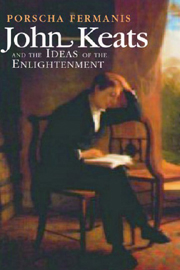Book contents
- Frontmatter
- Contents
- Acknowledgements
- Abbreviations
- Introduction: Keats, Enlightenment and Romanticism
- 1 Ancients and Moderns: Literary History and the ‘Grand March of Intellect’ in Keats's Letters and the 1817 Poems
- 2 Civil Society: Sentimental History and Enlightenment Socialisation in Endymion and The Eve of St. Agnes
- 3 The Science of Man: Anthropological Speculation and Stadial Theory in Hyperion
- 4 Political Economy: Commerce, Civic Tradition and the Luxury Debate in Isabella and Lamia
- 5 Moral Philosophy: Sympathetic Identification, Utility and the Natural History of Religion in The Fall of Hyperion
- Afterword: Ode to Psyche and Ode on a Grecian Urn
- Notes
- Bibliography
- Index
Introduction: Keats, Enlightenment and Romanticism
Published online by Cambridge University Press: 12 September 2012
- Frontmatter
- Contents
- Acknowledgements
- Abbreviations
- Introduction: Keats, Enlightenment and Romanticism
- 1 Ancients and Moderns: Literary History and the ‘Grand March of Intellect’ in Keats's Letters and the 1817 Poems
- 2 Civil Society: Sentimental History and Enlightenment Socialisation in Endymion and The Eve of St. Agnes
- 3 The Science of Man: Anthropological Speculation and Stadial Theory in Hyperion
- 4 Political Economy: Commerce, Civic Tradition and the Luxury Debate in Isabella and Lamia
- 5 Moral Philosophy: Sympathetic Identification, Utility and the Natural History of Religion in The Fall of Hyperion
- Afterword: Ode to Psyche and Ode on a Grecian Urn
- Notes
- Bibliography
- Index
Summary
Reflecting on the virtues of ancient poetry in his Critical Dissertation on the Poems of Ossian (1763), Hugh Blair claims that ‘an extensive search’ would uncover ‘a certain degree of resemblance among all the most ancient poetic productions’ on the basis that ‘in a similar state of manners, similar objects and passions operating upon the imaginations of men, will stamp their productions with the same general character’. It is, of course, to one of the first ‘states’ or ‘stages’ of society that the poems of Ossian ostensibly belong, and although Blair goes on to argue that the ‘resembling features’ apparent in these early stages tend to dissipate in the face of subsequent revolutions and diversions, he nonetheless continues to see the operation of manners and poetry as mutually dependent throughout the various stages of society, even if the principal effect of a greater degree of refinement is to subdue the vigour and sublimity of the imagination as literature, like language, ‘advances from sterility to copiousness, and at the same time, from fervour and enthusiasm, to correctness and precision’.
The idea of evolving states or stages of society was fundamental to eighteenth-century understandings of human progress, and Blair's Dissertation is suggestive of the ways in which Enlightenment developmental models were transferred from historical and sociological writing to representations of literary history in the period. It also points to the continuities between historical and other types of literary writing.
- Type
- Chapter
- Information
- John Keats and the Ideas of the Enlightenment , pp. 1 - 16Publisher: Edinburgh University PressPrint publication year: 2009



